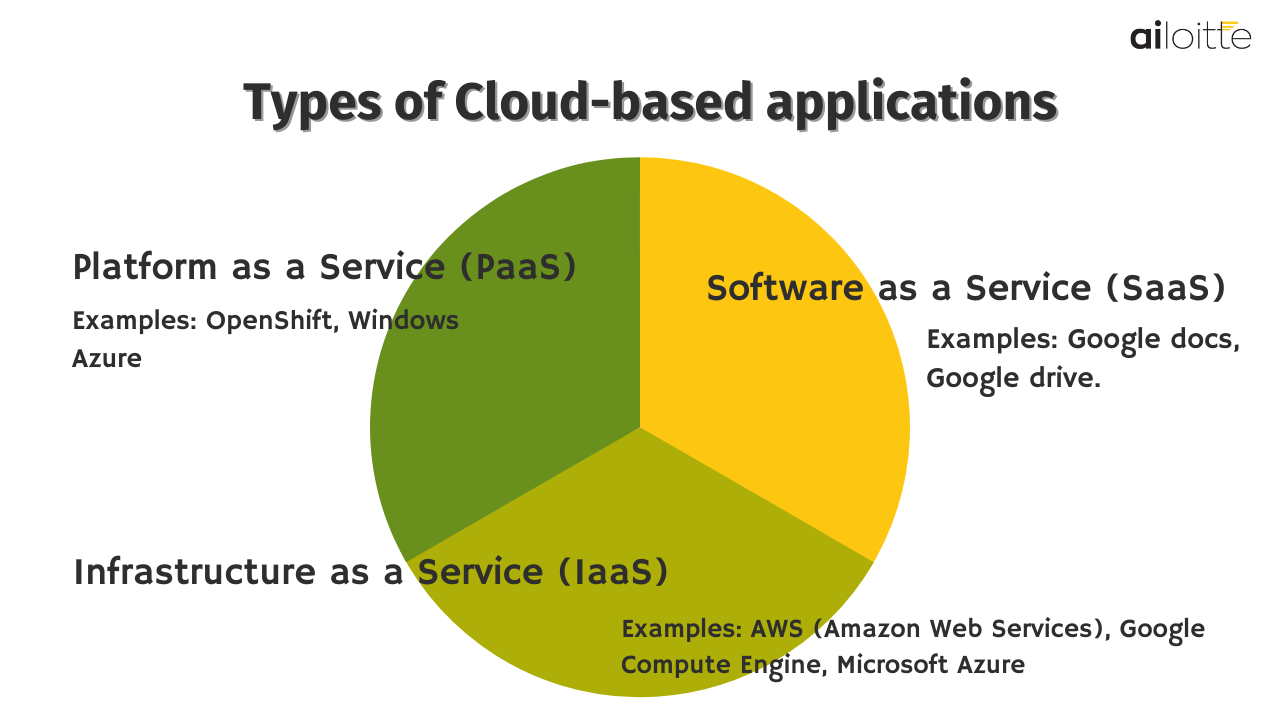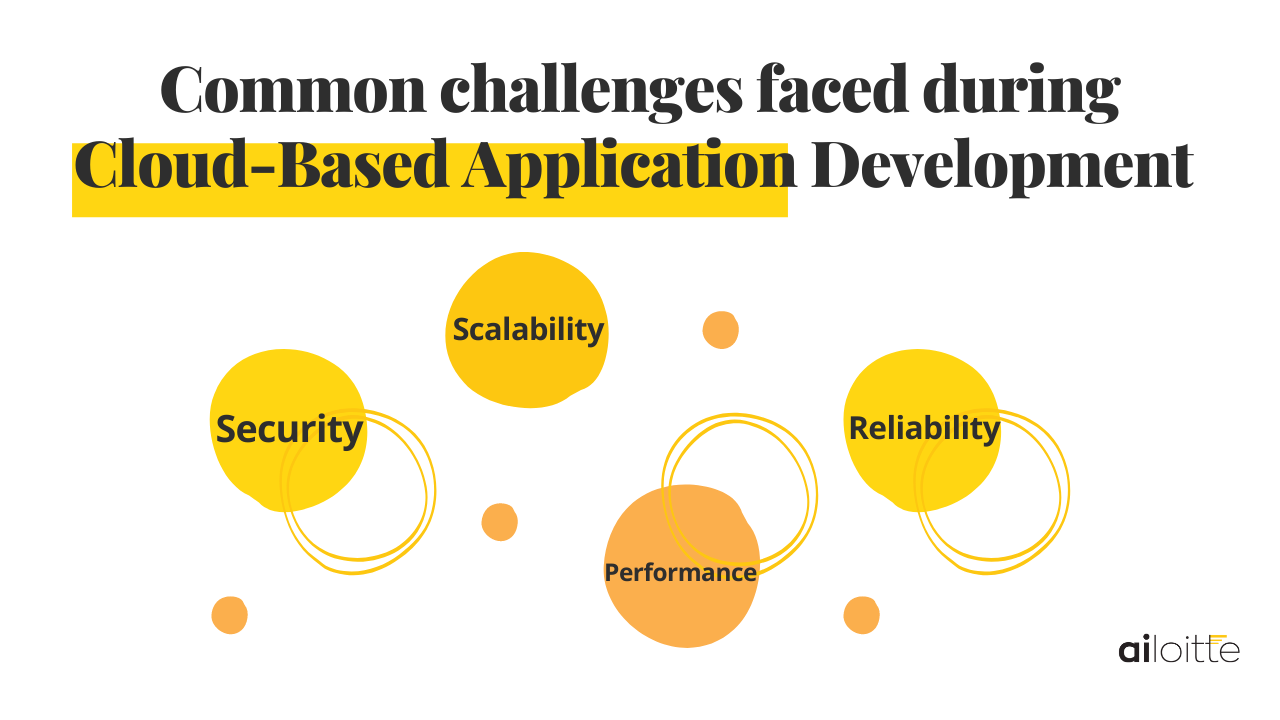The cloud model is gaining popularity in eCommerce and other specialized business areas due to benefits such as scalability, increased productivity, reduced traffic costs, and much lower equipment costs.
This article will explore the types of Cloud-based app development, benefits, and common challenges faced during app development.
What is a Cloud-based app?

A cloud-based app is an application that runs on the Internet and has components saved online, with some (or all) operations running in the cloud. It involves the online availability of a variety of materials and services (for example, data storage, servers, databases, and more).
There are three types of clouds that are commonly used for app deployment:
- Private cloud – a service that operates as a private online system, with a safe place for data, users, and applications. They are used by only one firm and are not accessible to the public.
- Public cloud – data stored in the public cloud is available online from any device. Public clouds may offer low-cost data storage and variable computing power.
- Hybrid cloud – Private and public clouds are joined to form hybrid cloud services. IT departments may transfer data across on-device services and third-party apps in this manner, identifying more versions for optimization and deployment.
Now, let us consider the types of Cloud-based applications.
Also Read – Cloud Security Best Practices: How To Prevent Attacks
Types of Cloud-based Applications
Cloud-based applications have three major types: SaaS, IaaS, and PaaS.
We will discuss each in detail.

Software as a Service (SaaS)
SaaS stands for Software as a Service. It is used for the development of cloud-based applications that are accessed via mobile apps and web browsers. These apps operate on third-party hardware rather than the users’ own devices, and their software is also hosted remotely. The main advantage of using SaaS is that consumers do not have to invest in expensive hardware or purchase subscriptions for each application update.
Examples: Google Docs, and Google Drive.
Infrastructure as a Service (IaaS)
The infrastructure as a service provider (IaaS) provider maintains your company’s infrastructure — servers, network, visualization, and storage — through a public or private cloud. The IaaS provider provides a complicated infrastructure and additional support to their customer, and the customer must construct a customized programming bridge between the application and its operating system. The method enables businesses to create a customized product without having to create the fundamental components from scratch.
Examples: AWS (Amazon Web Services), Google Compute Engine, Microsoft Azure
Platform as a Service (PaaS)
This form of cloud-based application development typically just necessitates the customer’s application code. You may rent everything you need to build an app while relying on a cloud provider for development tools, infrastructure, and operating systems using PaaS. Furthermore, the software is regularly updated, so developers may only use the most recent version. Because of the flexibility of PaaS, if a user wishes to scale or alter their app totally, they may do so.
Examples: OpenShift, Windows Azure
Common challenges faced during Cloud-Based Application Development
The development of cloud-based products is a technically challenging task. As a result, if you decide to utilize such solutions, you should be aware of all the potential risks to understand how to structure application development using cloud computing effectively for your firm.

Here, we’ll focus on the most typical issues of cloud-based app development:
Security
Cloud-based systems store and manage a vast quantity of private data. As a result, every company that uses such technology must address security concerns, guaranteeing that their client’s data is secure. Cloud apps may feature several API connectors and must be exceedingly user-friendly. The use of strong data encryption, SSL, and the reverse proxy will assist you in increasing the security of your cloud-based app. You may also use cryptography when the encrypted data is split into two portions and stored in distinct clouds.
Reliability
It is essential to pick a trustworthy cloud framework for your cloud application to function effectively without errors. If there is even a remote possibility that the chosen cloud framework will be unable to sustain essential functions, do not utilize it. However, using a private cloud to back up data and processes is a fantastic idea.
AWS services are commonly utilized for cloud application development as one of the most reliable cloud frameworks. AWS secures all the data and provides developers with a variety of additional tech options to work with.
Scalability
If you want to take advantage of a cloud app’s scalability, you must first consider its technical implementation. Choose hybrid cloud architecture to provide the scalability you want. A hybrid cloud approach can scale up and down as needed.
You must ensure that the service you’ve chosen allows for scalability. If you are unable to scale your product, you can’t regularly provide services to a much bigger audience, and your company will lose potential revenues.
Also Read – How to Migrate your Legacy Applications to the Cloud?
Performance
The performance of the app is essential for a great customer experience. If the number of servers is insufficient and your great custom UI takes more than 3 seconds to load on your customers’ desktops, the app customer experience is likely to suffer. Global providers position their servers to provide customers with the same page loading speed regardless of their location.
Content delivery networks (CDN) are also commonly used to accelerate content distribution. They’re commonly seen in cloud app infrastructure. Furthermore, you should investigate your cloud vendor’s architecture to ensure that your apps’ performance remains steady over time.
How can Ailoitte help you?
Ailoitte is a web and mobile app development company in Bangalore that delivers building high-quality applications for various businesses. We also offer cloud migration and quality assurance services, and expert solution architects and development teams to assist you in developing solutions of any complexity. Please contact us to learn more about the services we offer.
Wrapping up
Businesses gain from the cloud technique in numerous ways, including reduced development costs, improved accessibility of the final product, a new level of standardization, and scalability prospects.
Simultaneously, cloud-based application development is more difficult than web or desktop development since it includes additional factors to manage, such as many API connections, data architecture design, and data decoupling.
However, If you want to acquire current and adaptable company software, consider cloud app development tools or seek assistance from specialists.


















.png)
.png)
.png)



Thanks for sharing. I read many of your blog posts, cool, your blog is very good.